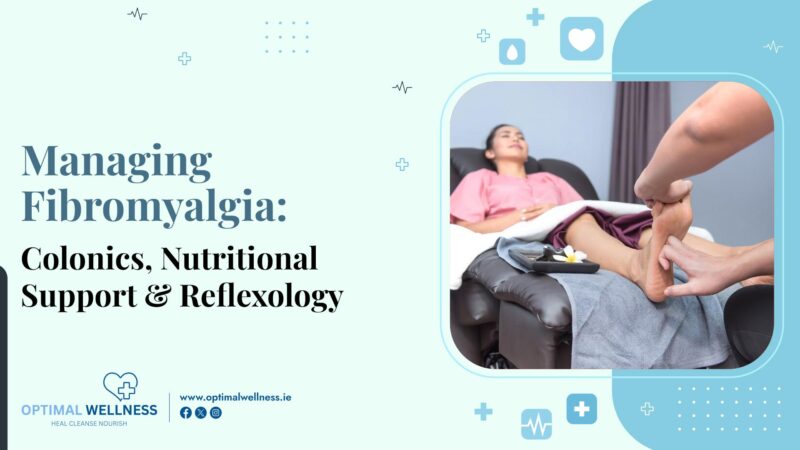Managing Fibromyalgia is a complex and often misunderstood condition that affects millions of people. Characterized by widespread pain, fatigue, and cognitive difficulties often referred to as “fibro fog,” it can significantly impact quality of life. While there’s no single test to diagnose fibromyalgia, a combination of symptoms, medical history, and careful assessments by healthcare professionals can help identify this chronic condition. The good news is that therapies like colon hydrotherapy, reflexology, and targeted nutritional support can offer relief and help improve overall well-being.
Managing Fibromyalgia: Colonics, Nutritional Support & Reflexology

One of the challenges with fibromyalgia is that it doesn’t show up on standard blood tests or scans, which can make diagnosis tricky. Instead, doctors typically look for a pattern of symptoms, including:
- Chronic, widespread muscle and joint pain lasting for at least three months
- Extreme fatigue, even after a full night’s sleep
- Difficulty concentrating or remembering things (“fibro fog”)
- Sensitivity to light, noise, and temperature
- Tender points on the body
It’s important to rule out other conditions with similar symptoms, such as hypothyroidism, arthritis, or chronic fatigue syndrome. While a definitive test doesn’t exist, a skilled practitioner can help guide you toward answers and support.
Colonics can play a role in managing fibromyalgia by supporting the body’s natural detoxification processes. Fibromyalgia is often linked to poor digestion, bloating, and constipation, which can worsen inflammation and discomfort. Colon hydrotherapy gently flushes out toxins and waste buildup from the colon, improving digestion and reducing bloating. This can result in:
- Increased energy levels
- Reduced abdominal discomfort
- Enhanced nutrient absorption
By clearing out the digestive tract, colonics create a foundation for better gut health which is closely connected to inflammation, immune function, and overall wellness.
Reflexology for Fibromyalgia Relief

Reflexology, a holistic therapy that applies gentle pressure to specific points on the feet, hands, and ears, has shown promise in alleviating fibromyalgia symptoms. Reflexology helps improve circulation, release tension, and promote relaxation key benefits for anyone dealing with chronic pain and fatigue. Regular reflexology sessions may:
- Reduce muscle tension and stiffness
- Improve sleep quality
- Lower stress levels and enhance mental clarity
The calming effects of reflexology are particularly helpful for people with fibromyalgia, as stress and poor sleep often worsen symptoms.
Diet plays a crucial role in managing fibromyalgia symptoms. A nutrient-dense, anti-inflammatory diet can help reduce pain, improve mood, and boost energy levels. Here are some dietary tips:
- Increase omega-3 fatty acids: Foods like salmon, walnuts, flaxseeds, and chia seeds can help reduce inflammation.
- Eat plenty of fruits and vegetables: Packed with antioxidants, they combat oxidative stress, which is common in fibromyalgia.
- Focus on magnesium-rich foods: Dark leafy greens, nuts, seeds, and whole grains support muscle relaxation and energy production.
- Avoid processed foods and sugar: These contribute to inflammation, energy crashes, and digestive issues.
- Stay hydrated: Proper hydration supports energy levels and helps flush out toxins.
Supplementing with key nutrients, such as magnesium, CoQ10, and vitamin D, can also provide extra support. Magnesium, in particular, is often depleted in individuals with fibromyalgia and is essential for reducing muscle cramps and fatigue.
Managing fibromyalgia requires a holistic approach that addresses the whole body. By improving digestion, supporting detoxification, and reducing inflammation, you can help your body function at its best and reclaim some of the energy and vitality that fibromyalgia can take away.
If you’re living with fibromyalgia and looking for natural ways to manage your symptoms, therapies like colon hydrotherapy and reflexology can be powerful tools. Alongside tailored nutrition, these approaches work to support your body, reduce discomfort, and improve your overall quality of life. Remember, small changes can lead to big improvements and you don’t have to navigate this journey alone.
Take a holistic approach to colonics, reflexology & nutritional support to manage fibromyalgia with Optimal Wellness.

